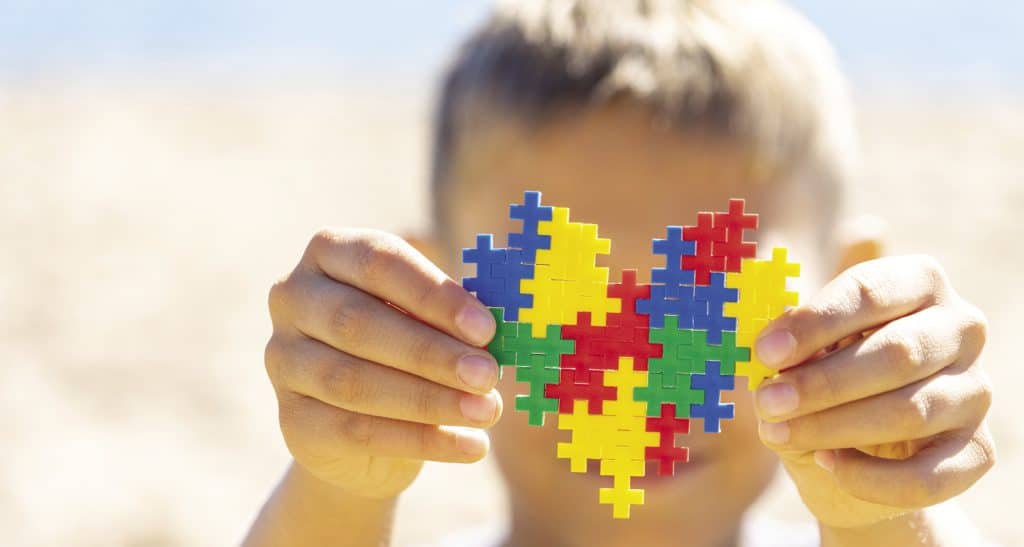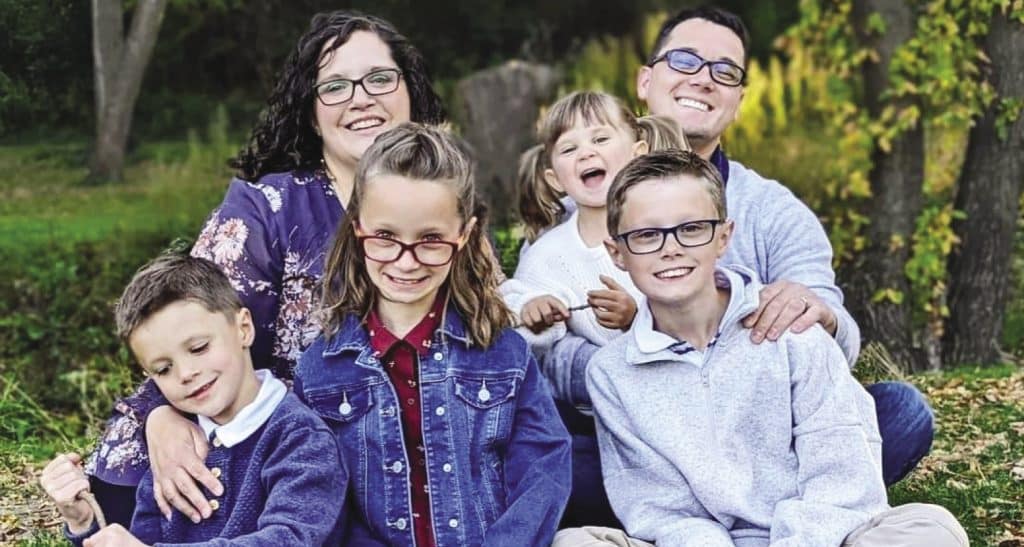This father shares how the journey of supporting his two sons
with special needs has enriched and informed his faith.
According to C.S. Lewis, “Miracles are a retelling in small letters of the very same story which is written across the whole world in letters too large for some of us to see.” Recently, my faith has been lacking so I was missing the miniature and miraculous letters forming a story before my own eyes.
While it’s hard to pinpoint the exact moment I took my faith seriously, an important factor is my vocation as a father. I have four children: two sons and two daughters. Both of my sons are diagnosed with autism spectrum disorder (ASD). Because of this, the subjects of autism acceptance and neurodivergent awareness are dear to my heart.
Autism Is Lifelong
ASD is not a temporary phase a child or adult goes through in life. It is also not a disease to eradicate or cure. It’s a lifelong condition, and that’s OK. It is my job as a father to teach my autistic sons the skills necessary for a happy and healthy life.
ASD refers to a range of conditions characterized by challenges with social skills, repetitive behaviors, speech, and nonverbal communication, as well as by unique strengths and differences. In 2021, approximately one in 44 children in the United States was diagnosed with ASD (AutismSpeaks.org). As science progresses, our awareness of autism continues to develop and shows that the disorder contains as much variance as color wavelengths in the rainbow.
Early diagnosis was key in getting my boys the best and most appropriate services to help them learn and grow. According to Autism Parenting Magazine, most children are diagnosed after age 4. My older son, Noah, was 4 years old when we had him evaluated for ASD; my younger son, Josiah, was 18 months old.
Finding Direction
Before we had an autism diagnosis for Noah, we had a lot of frustrations about his behavior. It took a few years for my wife, Jennifer, and me to figure out the situations and things that triggered his meltdowns. We often felt inadequate and unprepared to calm him down.
During our journey toward a diagnosis, Jennifer and I had our son evaluated because he exhibited obsessive-compulsive disorder tendencies, social and communication difficulties, and various obsessions (such as dinosaurs, cars, and superheroes).
As a new parent, I got lots of parenting advice from “experts.” My son did not sleep through the night for the first time until he was 3 years old. I felt like I was being told, “You do not know what you’re doing.” I doubted my ability to parent. After he was diagnosed, a weight was lifted. We understood why some things were so much more challenging and we were given options to help him. I may not have been an expert, nor am I today, but at least my family has more direction to help our boys.
In the case of Josiah, Jennifer and I already had some idea of clues and behaviors in terms of whether or not we should get him diagnosed. We noticed that he wasn’t talking or interacting, and he would reach sensory overload in different situations. He wasn’t able to communicate his needs and got frustrated quickly.
While Josiah has made incredible growth and meltdowns have been limited drastically, he still struggles when his daily routine is disrupted with little or no warning. Something as small as a change in the order of classes or a swing not being available on the playground can cause him frustration. These small changes are important to him. The autistic mind thinks logically, and everything must have a place and order; skipping a step at the beginning or middle throws the lesson or activity off-kilter.
In a fast-paced world, I am constantly challenged to slow down to listen to my boys’ needs, wants, and desires. Communicating potential changes to our daily and weekly schedule is a must in order to help ease anxiety. We have learned that visual schedules are amazing and help all of our children to know what to expect.
Building Faithful Habits
One of the most interesting things I have learned while raising my children is the strength of their habits. It is almost ritualistic how my sons play. When my son Josiah was little, he would line up all his toy cars and look at the wheels. He played with the same toys for months. At the park he would often get caught in a loop where he would take the same exact path in climbing up the stairs and using the slide. If he got sidetracked out of his loop, he would be lost until we got him back on the path.
I have to be cognizant of giving directions in a precise, logical, step-by-step manner when getting him to complete daily tasks like going on errands, bedtime, and dinner. My sons’ need for order and consistency is crucial to help them feel grounded, and that has helped me forge newer and better habits.
First of all, I learned how to communicate in a simpler and more direct manner. I discovered how to think in a different perspective. This “breakdown and rebuild” of my communication style helped most on Sundays. I took for granted common things about the Mass, so I started to pay more attention to the sounds, smells, and artwork. Loud and unexpected sounds can jostle any child’s attention, but they can disrupt an autistic child for much longer. Josiah didn’t know what to expect when it came to Mass, and it was even tougher if we had to attend at a different time or parish.

Consistent expectations helped my children get less anxious about attending Mass or new events. Printing out a visual Mass schedule with all the parts of the liturgy pictured helped ease tensions and worries on Sunday. I could see the weight of anxiety lift and be replaced with excitement.
In the first three weeks of using the visual schedule, my family attended Mass at a different location. Change is normally hard for Josiah, but the schedule helped remind and teach him what to expect during the liturgy. Knowing the amount and order of the steps of Mass gave him a better way to think about and focus on the liturgy.
Another tool I used to help Josiah concentrate during Mass was a weighted vest. The vest includes six beanbags that fit inside to provide deep pressure stimulation, which reduced my younger son’s anxiety drastically, allowing him to focus better. The tight squeeze of the vest also reminds me of God’s closeness to me and helps me reflect on his mercy.
This way of thinking has helped lead me to better recognize God’s plan of salvation in the Bible. I’ve been listening to Father Mike Schmitz’s Bible in a Year podcast, and he shows how God provides a plan and prepares his people—step-by-step. It’s revealed over time, and raising my boys has shown me how God’s love is patient and persistent over time.
The Joy of Autism
Along with forcing me to improve my communication and teaching abilities, parenting autistic children has led to several joys.
One of the joys of the autistic mind is having an amazing memory. Noah remembers things he did as a 1- and 2-year-old. He is a walking encyclopedia. He can rattle off facts on many topics: animals, dinosaurs, and ninjas, to name a few! Josiah also has an incredible memory; he often points out things I forgot.
My kids feel deeply, and their joy is infectious; some days, I love to watch them freely playing. My kids enjoy helping our 6-year-old make car washes out of cardboard. Everyone’s goal in life should be to find someone who looks at you the way Josiah looks at the spinning brush at the car wash. It’s beautiful.
It may seem counterintuitive, but the struggles Josiah faced while we were teaching him to talk are more of a joy as time passes. Because autism is a spectrum, not every autistic child exhibits language development in the same way. He didn’t speak until he was over 2 years old with amazing support from our local early intervention. If Jennifer and I didn’t get the support we needed as early as we did, it’s possible Josiah still wouldn’t be able to express his needs.
I recently took the kids to the library, and I was helping my oldest child find a book when I heard Josiah ask the librarian for help in finding Bob Books. While this appears to be a simple and ordinary event, communicating his needs and wants has been a consistent goal for him. God took an ordinary milestone and used my son’s journey to infuse joy into my day.
Additionally, my sons are detail-oriented and quick to remind me whenever something seems out of place with our daily routine or activity. Some days their frequent corrections bog me down. Yet overall, this ability to recognize inconsistencies in both life events and logic will serve the boys well in the future.
The struggles I face as a dad sometimes feel like a burden, but when I look to the joy in my sons’ milestones, the weight is lifted. It’s like allowing Jesus to ease your cross by letting him help you along the way.
Faith Stabilized Me
Raising neurodivergent kids has forced me to rely on God and others more. Until Jennifer and I learned more about our sons’ diagnoses, we learned by trial and error what caused meltdowns or triggered outbursts. This was difficult at times, but in hindsight I realize God gave me the gift of faith to continue to seek him out.
Preparing meals is a daily thing for everyone, but in my family’s situation it can be difficult due to the various aversions my sons have to different textures and certain flavors in food. Something simple like eating hamburgers or turkey is a process. Through feeding therapy, we have been able to expand the list of foods that work well at mealtimes.
Other daily challenges my sons face include putting on socks, wearing certain shirts with tags, and the switching of pants or shorts for the season. Imagine trying to socialize or pay attention at school while you feel the tag on your shirt scratching you, the sharp seam of your socks digging into your toes, and the sensation of long pants itching your legs after finally getting used to shorts. We found that a “brushing protocol” was helpful to lessen the sensory input for these situations.

Matt Chicoine and his wife, Jennifer, are pictured with their four children (from left to right): Josiah, Amelia, Avila, and Noah. Matt says the experience of raising two children with autism is an example of how “God’s love is patient and persistant.”
During the first part of the COVID-19 pandemic, Jennifer and I had to buy several different types of face masks because many brands bothered Noah. Even though he knew the importance of masking to limit the spread of the novel virus, the sensory input was too much for him at first.
Continuing to rely on my Catholic faith helped get me through the toughest days. I doubted my ability to parent during the early parts of my sons’ autism diagnoses, yet Sunday Mass acted as a recharge for me. Daily prayer and reading about the lives of the saints helped me too.
Living the Works of Mercy
According to the Catechism of the Catholic Church, “The works of mercy are charitable actions by which we come to the aid of our neighbor in his spiritual and bodily necessities” (2447). Sometimes I forget the “neighbor” in need is my children.
God provides graces through the sacrament of marriage to help me love him and my family. The corporal works of mercy may look a bit different for each family, but in my situation it involves working nights so my son can attend outpatient therapy to help him learn to regulate and communicate. And it takes the form of engaging Noah in his latest obsession: Pokémon, dinosaurs, Legos, etc. Or it even means hugging them extra tight after a stressful day at school.
Regarding the spiritual life, I have learned to teach my kids in a different way and to be patient. Modeling the faith and taking things in small steps is what works in our family. When I am intentional and show love in a tangible way, my kids are much more receptive to learning about the faith. Praying an entire rosary will always be a long-term goal for my family; realistically we can only handle a decade at a time. Small moments have big impact, and I have learned that my kids will get more out of these small moments.
Living the Gospel
Before I had children, I viewed the Gospel in more of a legalistic and rules-based manner. If you followed the Ten Commandments and all the precepts of the Church, you would go to heaven. And while that view isn’t technically wrong, it fails to see the faith in its fullness: relationship with God.
Parenting my children has forced me out of my comfort zone. My vocation as a dad pushed me into the messiness of real life. I also learned more about practical applications of the corporal works of mercy.
I often reflect on Matthew 25:31–46, where Jesus describes to his followers how caring for one’s neighbor is caring for Christ himself. Sometimes I take my vocation for granted. Sometimes I think I need to serve God in extraordinary affairs like the great missionaries or evangelists in Church history. But every time I tend to my kids’ needs, I’m caring for Christ.









3 thoughts on “Parenting Kids with Autism ”
Very nice Matthew.
Such a beautiful testament of your faith. God bless your family
I have an autistic grandson who is in his thirties now. You seem to be doing an amazing job with your children. Thank you for sharing your trials and thoughts. Sometimes there is an adult in the family who causes more harm and suffering than the autistic person. This can become a more serious problem. We all need to keep our rosary handy.
.